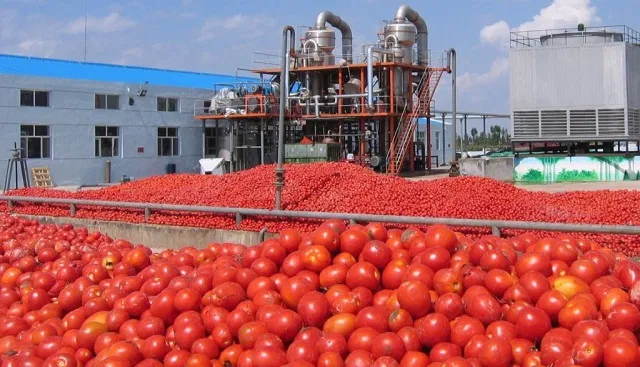- Firm yet to take off three year after land allocation
- Prospect of generating over 65,000 jobs dim
Three years after the Katsina State government granted 5,000 hectares of land to Erisco Foods Limited to establish a 750,000 metric tonnes per annum Tomato Paste Processing Plant, the company is yet to commence production.
Investigation showed that the project suffered a major setback due to the failure of the Central Bank of Nigeria (CBN) to release its counterpart funding of $460,000.00. The decision not to release Forex was not unconnected with the apex bank’s foreign exchange policy blacklisting some items from accessing Forex.
The prospect that the plant would generate at least 15,000 factory workers directly and offer rare opportunities to over 50,000 farmers in the core north is gradually fading into oblivion.
At separate session with THISDAY recently, different stakeholders lamented the state of the tomato processing plant, which Erisco Foods Limited initiated in 2017 and to which the Katsina State Government allocated 5,000 hectares of land for its takeoff.
One of the state functionaries, who privately spoke with THISDAY, lamented that despite 5,000 hectares the state government allocated for the plant, tomato paste production had not taken off three years after Katsina State and Erisco Foods Limited agreed to establish the tomato paste plant.
Originally, the official explained that the project, which was situated in Sabuwa Local Government Area (LGA) based on contractual agreement, was designed to take off in the first quarter of 2018 and be completed in 2020.
However, according to the official, the tomato paste processing plant has been abandoned just after the foundation stone of the project was laid in 2017.
The proposed plant, which was expected to harness raw tomatoes cultivated by farmers in the northern part of the country, has the capacity to employ 15,000 factory workers and 50,000 farmers across the zone.
The findings also noted that the plant was designed to enable Nigeria earn foreign exchange by exporting the products from the factory to other African states.
The President and Chief Executive Officer, Erisco Foods Limited, Mr. Eric Umeofia allegedly ascribed delay in the company’s takeoff to the Central Bank of Nigeria (CBN).
THISDAY gathered that the inability of the Central Bank of Nigeria (CBN) to release enough intervention fund/ FOREX to the company to import agricultural tractors, improved tomato seedlings, fertilizers, chemicals and machineries might be among other reasons delaying the take off of the project in the state.
At another fora, Umeofia claimed that the apex bank refused to give approval to its own deposit of $460,000.00 generated from “our foreign operations”.
He explained that the CBN also refused “to give us FOREX to import machineries, machine spare parts and raw materials to be used for processing of Nigeria fresh/dry tomatoes into tomato paste in our Lagos factory.
“In addition to their refusal to give us enough intervention fund/FOREX after several promises to import agricultural tractors, improved tomato seedlings, fertilizers, chemicals, machineries for our Katsina project.”
However, the company’s president threatened to relocate the tomato processing plant to China, where he claimed finished products, would be imported and sold to consumers in Nigeria and globally but could not.
According to him, the decision to shut down the processing plant was taken after the expiration of a 30-day ultimatum given by the management of the company to the federal government to place a total ban on the importation of tomato paste into the country.
Despite the total ban on importation of tomato paste and other foreign commodities by federal government, Erisco Foods Limited is yet to resume work at its abandoned Tomato Paste Processing Plant in Sabuwa
However, the Director General, Katsina State Investment Promotion Agency, Engr. Ibrahim Tukur Jikamshi, claimed that the state government had given all the needed supports to Erisco Foods Limited for the takeoff of the project, but the project had not taken off.
Jikamshi said: “We gave him 5,000 hectares of land very vast and then we gave him another 4 hectares where he will settle up the company and we even take care of his bills for the commissioning and other things.
“And he equally did clearing of almost 4,000 hectares. His own argument as of that time was that he wanted the government to ban importation of tomatoes first. And he needed to import some things and for that he needed foreign exchange. We (government) applied on his behalf so that he could get it and we process his documents and it was granted.
“But for his own reasons, he said he did not like the site again, he came back along Kano/Katsina road where he bought one plot of land immediately after Dandagoro.
“Then, he abandoned that one too and bought another plot very close to Darma poultry. If you go there now, you will see a very large plot of land with a lots of blocks been mounted there, then later he abandoned that place.
“He went and bought another farm immediately after the Kwana Are Dam where he assembled blocks and sank borehole. He has been waiting for the ban on importation of tomato pastes but it has been banned. So, we are waiting for him to see what he can do,” the managing director said.
Jikamshi, however, said the state government “has commenced the construction of a N3.3 billion economic green zone to woo both national and international investors in the state.
“The 800 hectares project, situated along Katsina-Jibia road, when completed, would generate more employment opportunities to thousands of unemployed Nigerians and enhance the economic viability of the state.
“The state government is equally providing not only the basic infrastructure but more of the infrastructural facilities to ensure the speedy completion of the green industrial park.
“Katsina is now the only state in Nigeria that is creating an economic green zone along Jibia road on 800 hectares of land and we have started developing 100 hectares as a first phase of the project to the tune of about N3.3 billion.”
Source: THISDAY












